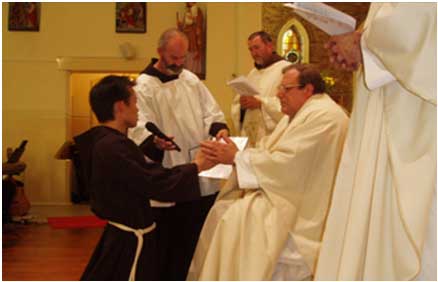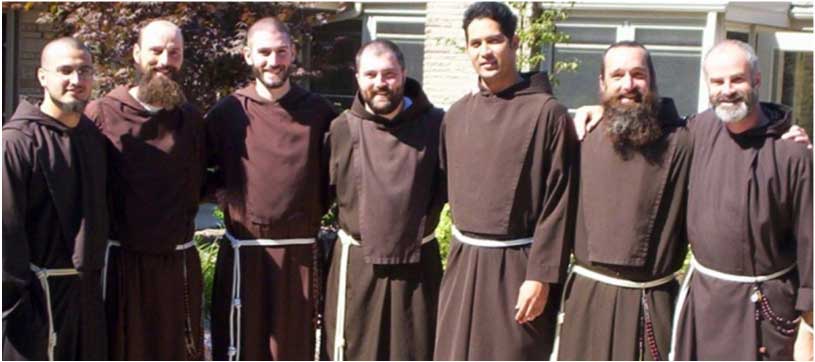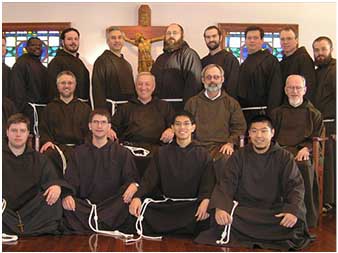
POST NOVITIATE STAGE 1
Once the student friar has made his temporary profession, he enters into post-novitiate formation. The first stage of Post Novitiate is a seven month period of further maturity and preparation for making a full life-long commitment to the Gospel way of life. It is also a time of consolidating and integrating, in a normal functioning friary, all that has been learnt in the initial periods of formation (FTF 28). This does not exclude study, yet for Post-novitiate Stage One, the study remains in-house and will include the study of Sacred Scripture, Franciscan history, spirituality and hagiographical studies. This period will include apostolic work with a particular focus on the poor and marginalised as well as the youth of the Church. The student will be expected to develop and to grasp an effective emotional and sexual maturity and an adult faith (Const. n. 30,3). Importantly the post novice will demonstrate that he can live the life of a Capuchin according to our contemplative, active, fraternal, simple, joyful, and lesser manner.
 POST NOVITIATE STAGE 2
POST NOVITIATE STAGE 2
The second stage is when a temporarily professed friar will make a concrete choice as to his preferred path, that is, as a brother in formation either for or without Orders (priesthood). Despite this, there will be no separation in fraternal life or duties as we are all considered brothers without distinction (PCO IV, 22). The friar will commence formal studies at an approved theological institution. For those who are going on to priesthood, they will need to complete all of the courses for priestly ordination that the Church requires. For those who have chosen the lay brother vocation, they do a basic level of study of some fundamental courses of Scripture and theology – depending on their capacity for study – and can then specialise in some kind of training that is to be determined in conjunction with his Post-novitiate director. The student friars continue to do in-house Franciscan formation, apostolic ministry, as well as workshops on celibate living, retreats, days of recollection and fraternal duties.
At the end of his third year in temporary vows, the student friar will have the opportunity to renew his temporary vows or to leave. Each member of the community will also have an opportunity to make known their views on the suitability of the student to renew his vows. About two years after the renewal of his temporary vows, the student friar will make his perpetual profession, vowing to live the Life of the Friars Minor in poverty, chastity and obedience for the rest of his life.
SPECIAL FORMATION
 Once the friar is fully professed, he continues to carry out his special formation – either for priesthood if he is going to be ordained, or in a special area if he will remain a brother. Those going on to priesthood need to complete their philosophical and theological studies (much of which is done during the second stage of Post Novitiate). He will then be ordained as a transitional deacon and between six months to a year, be ordained as a priest.
Once the friar is fully professed, he continues to carry out his special formation – either for priesthood if he is going to be ordained, or in a special area if he will remain a brother. Those going on to priesthood need to complete their philosophical and theological studies (much of which is done during the second stage of Post Novitiate). He will then be ordained as a transitional deacon and between six months to a year, be ordained as a priest.
ONGOING FORMATION
An important thing to remember is that just because a friar has made his perpetual vows it does not mean that his formation has finished for the rest of his life (PCO4 p.40). Ongoing formation is about having the right attitude of renewal, of continuous renewal acknowledging that we all have a need for continuous conversion. In this period a friar should keep returning to the sources of Christian life and to the traditional spirit of the Order (Const. n. 41, 2). This period involves both education and keeping up to date so as to be competent in the world and effective in our mission (Circular letter n.8 pg. 2) The fraternity is the pre-eminent place for this formation (Const. n. 43, 3).




 The Novitiate is a time of deep reflection and personal prayer guided by the help of experienced spiritual directors. It is also a time for experiencing more fully the rhythm of community prayer (especially the Liturgy of the Hours). The Australian Capuchin Province sends its novices to the International (English-speaking) Novitiate which is situated on the outskirts of Santa Barbara, California – a peaceful environment to free the novice from the distractions of normal day-to-day life and give him the space and quality time to be able to truly hear and discern the will of the Lord. The novice learns to live in a fraternity, with a number of peers (there were 13 novices in 2019) so that both he and the Order can discern if he is truly suited to a fraternal way of life. The year also involves some ministry to the poor and fraternal house duties.
The Novitiate is a time of deep reflection and personal prayer guided by the help of experienced spiritual directors. It is also a time for experiencing more fully the rhythm of community prayer (especially the Liturgy of the Hours). The Australian Capuchin Province sends its novices to the International (English-speaking) Novitiate which is situated on the outskirts of Santa Barbara, California – a peaceful environment to free the novice from the distractions of normal day-to-day life and give him the space and quality time to be able to truly hear and discern the will of the Lord. The novice learns to live in a fraternity, with a number of peers (there were 13 novices in 2019) so that both he and the Order can discern if he is truly suited to a fraternal way of life. The year also involves some ministry to the poor and fraternal house duties.
 POST NOVITIATE STAGE 2
POST NOVITIATE STAGE 2 Once the friar is fully professed, he continues to carry out his special formation – either for priesthood if he is going to be ordained, or in a special area if he will remain a brother. Those going on to priesthood need to complete their philosophical and theological studies (much of which is done during the second stage of Post Novitiate). He will then be ordained as a transitional deacon and between six months to a year, be ordained as a priest.
Once the friar is fully professed, he continues to carry out his special formation – either for priesthood if he is going to be ordained, or in a special area if he will remain a brother. Those going on to priesthood need to complete their philosophical and theological studies (much of which is done during the second stage of Post Novitiate). He will then be ordained as a transitional deacon and between six months to a year, be ordained as a priest.